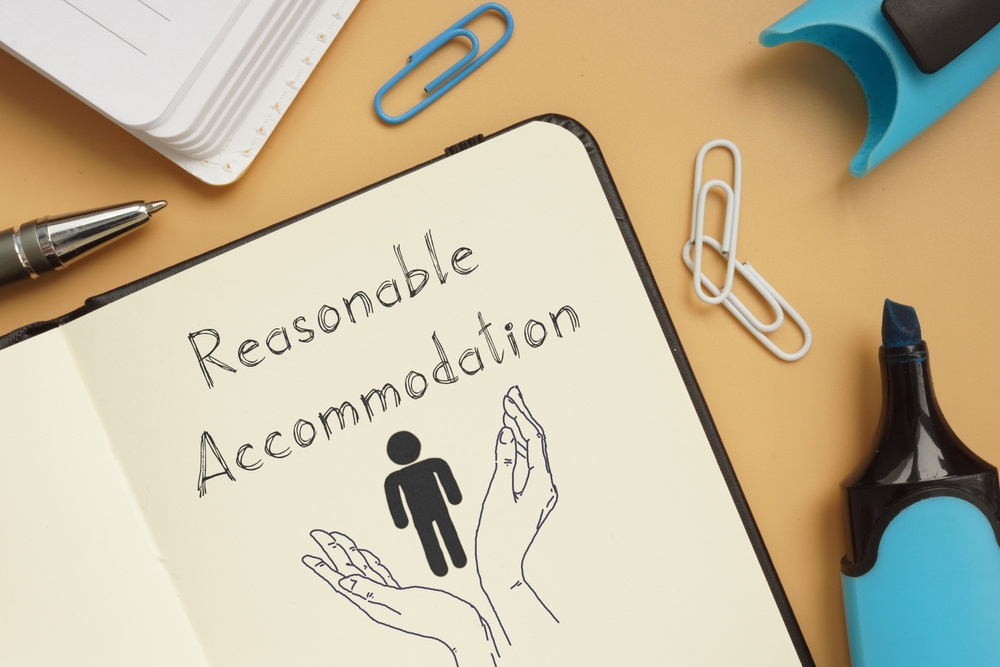- 07 November 2022
- Uncategorized
Reasonable Accommodation: What it Means in New Jersey


You’re in the right place if you’re wondering whether it is legal for you to get fired or not
while on disability in New Jersey.
American With Disabilities Act (ADA)
The Americans With Disabilities Act is a Federal law that protects workers from being
penalized for disabilities. The essence of the law is that any worker with a physical or
mental condition that substantially impacts one or more of their ordinary life activities is
considered “disabled”.
Employers must make reasonable accommodations to enable such workers to gain or
continue employment and may not discriminate against them because of disabilities.
You cannot be fired for a disability if a reasonable accommodation can be made.
But not all conditions are covered, and not all accommodations are “reasonable.” If the
act does not cover the condition, or if the accommodation required to continue
employment is not “reasonable,” the worker is not protected.
If you live in New Jersey and believe you may be covered by the Americans With
Disabilities Act, or if you believe an employer has discriminated against you in violation
of the ADA, you should consult with an employment law attorney NJ.
Examples of Reasonable Accommodations
A reasonable accommodation could involve some modification of the job, its duties or
descriptions, or the terms of employment. Reasonable disability accommodation
examples include:
● Changing the schedule of the job or hours of the job or changing the hours from
full-time to part-time to allow the employee to work a shorter shift;
● Allowing the employee time to attend medical treatments for a chronic condition
or to take medication;
● Allowing the employee to work from home if the job tasks permit work from
home;
● Taking unpaid medical leave;
● Making minor changes to employee policies
● Weight or motion restrictions or changing the workstation from a standing to a
sitting position;
● Reassigning job duties or changing the employee to a different, open job;
● Providing special equipment to allow the employee to perform the task.
Examples of Unreasonable Accommodations
Not all accommodations are reasonable, and employers are not obliged to make
changes deemed unreasonable.
As a rule of thumb, workplace accommodations will be considered reasonable if the
cost of the accommodation does not outweigh the benefit to the employer. The
employer is also not obliged to make any change that eliminates an essential job
function.
Whether the company can afford the accommodation is thus a key factor. Larger
companies may require more elaborate and expensive accommodations than smaller
ones.
A highly skilled technical job with higher wages may require more accommodations by
the employer than a low-skilled, minimum-wage job. Low-skilled jobs are also often
highly physical, and many changes to the physical routine would effectively destroy the
job requirements.
Another key factor is the duration of the accommodation. An employee who suffers from
an injury that will heal, such as a dislocated shoulder or a broken leg, might be entitled
to more accommodation than an employee with a permanent disability. The former will
end over time, and any accommodation must only be temporary.
How Do I Request Accommodation From Your Employer?
Suppose you believe you have a disability that affects your work and wish to have
accommodation for it under the ADA. In that case, you must take the initiative and
request accommodation from your employer.
Your employer should enter into an interactive discussion with you to determine what
job tasks you can reasonably perform as written, what tasks will need to be dropped,
and what tasks can be performed with accommodation. Your employer should also
explore which tasks are integral to the job and cannot be accommodated.
Your employer is not obligated to provide you with the accommodation you requested
under the law. However, your employer must be willing to make reasonable
accommodations to enable you to carry out the essential work functions of your job.
If your employer fails to do so or makes any accommodations, they fail to comply with
the Americans With Disabilities Act terms and can be held liable for his actions.
If you have questions about the Americans With Disabilities Act, workplace
accommodations, or believe you have been discriminated against, Ashton E. Thomas,
Esquire, a reasonable accommodation lawyer, can help you answer and settle your
case.
As an experienced employment attorney in NJ, Mr. Thomas will discuss your situation with
sympathy and honesty and can help you understand the law. Call today for an
appointment and get the relief you deserve.
